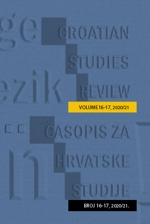The novel Restoran Dalmatia by Jagoda Marinić – The authentic voice of identity and life doubts of the second generation of Croatian migrants in Germany
The novel Restoran Dalmatia by Jagoda Marinić – The authentic voice of identity and life doubts of the second generation of Croatian migrants in Germany
Author(s): Milan BošnjakSubject(s): Croatian Literature, German Literature, Migration Studies
Published by: Croatian Studies Centre
Keywords: Croats in Germany; Croatian literature; migrant literature – new German literature; canon; identity; imagology;
Summary/Abstract: Many Croats live and work in Germany – in different occupations, socio-economic positions, and with various degrees of integration into German society. There are also writers among them. Some Croatian writers are political emigrants, and some are Croatian civil servants. They, like the older generation of economic migrants, write mainly in Croatian and have a strong connection to Croatian literature and culture, while their connection to German literature and culture is weaker. It is an observable fact that the young generation, mostly the second generation of economic migrants, is very active in literature, writing mainly in German on ‘Croatian’ topics. Their literary works function very well as an integral part of German literature, but since we live in a time when we should not be exclusive in defining identity, but open and inclusive, we also read them as works of Croatian literature. The most prominent authors of that generation are Jagoda Marinić, Marica Bodrožić, Nicol Ljubić and Nataša Dragnić. In the central part of this paper, we will analyse the novel Restaurant Dalmatia by Jagoda Marinić in which the author excellently describes the intercultural and multicultural atmosphere of the big city (here Berlin and Toronto), where members of the second generation of migrants seek and create their identity between family and the environment in which they have grown up; in addition, in a globalized world, the possibility of a third identity is also readily available. When reading the novel Restaurant Dalmatia, it becomes clearer to us that identity is built throughout life, under different influences, in different ways, and with different intensity.
Journal: Croatian Studies Review - Časopis hrvatskih studija
- Issue Year: 2021
- Issue No: 16-17
- Page Range: 73-86
- Page Count: 14
- Language: English

